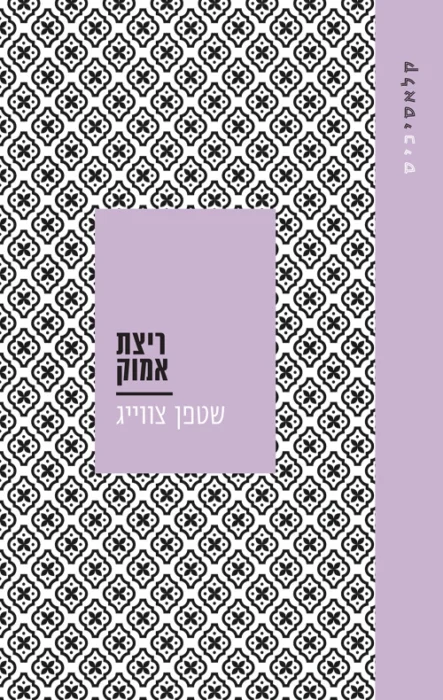For English review, please scroll down.
וידוי עלוב, מפתיע, טורד מנוחה: גבר מספר על ריצת אמוק — הטירוף שגרר אותו לאובדן. שטפן צוויג, אמן הרגישות והדיוק הפסיכולוגי, מגיש כאן סיפור קצר שמתחיל בווידוי אקראי באונייה, אך חותר במהירות אל עומק רגשי מסוכן. הרופא, גבר אירופי בגיל העמידה, משחזר רגע שהוציא אותו מעצמו — ממה שהכיר על עצמו ועל עולמו. הסיפור מתרחש בהודו הקולוניאלית, אך התחושה היא שמדובר בזירה פנימית הרבה יותר: מרחב שבו היצר חותר תחת המוסר, והתודעה נאבקת במעמקים שהיא עצמה הדחיקה.
הרופא, אדם מתורבת, מיושב ותקין־ערכים, פוגש אישה מסתורית שמבקשת ממנו לבצע עבורה הפלה. מאחר ומדובר בתקופה שבה הפלות היו מחוץ לחוק, הוא מסרב, אך מהר מאוד משנה את דעתו, והסירוב הופך למוקד של אובססיה. הוא נמשך אל האישה, אל החוזק שלה. נבלע בתשוקתו ומאבד שליטה על ההיגיון. צוויג כורך את ההידרדרות הזו במונח "ריצת אמוק" — אותו טירוף פתאומי שבו אדם משתולל בלי גבול, עד להתמוטטות גמורה. התהליך שמתאר צוויג אינו רק גופני או רגשי, אלא מכתש פסיכולוגי שבו האני מתמוסס.
האישה עצמה נשארת חידתית. כמעט ארכיטיפית. אין לה שם, קול או עבר. היא יפה, גאה, בלתי מושגת — דימוי מפתה שאי אפשר לדעת אם הוא קורבן של העולם הפטריארכלי או תמרור אזהרה שנועד להתרסק לתוכו. הרופא לא מצליח להבין אותה, וגם הקורא לא. ובכך בדיוק טמון אחד מכוחותיו הספרותיים של צוויג: הוא לא מנסה להסביר את האישה — רק לחשוף את הכאוס שהיא מייצרת בגבר.
הסיפור כתוב בדיוק קליני אך עם להט פנימי שמסרב להירגע. למרות אורכו הקצר, הוא סוחף כמו רומן שלם. התיאורים מדויקים, הדיאלוגים רזים אך אפקטיביים, והמתח לא מתפוגג גם כשהכול כבר נאמר. ברקע מהדהד כל הזמן המתח שבין מזרח למערב, בין קולוניאליזם לאקזוטיקה, בין תרבות שהגיעה "לשלוט" לבין תשוקה שהיא לא מסוגלת להכיל. צוויג לא מטיף, לא מנסח עקרונות מוסריים — הוא פשוט משקף את הקרע.
אם יש נקודת חולשה לסיפור, היא באופן שבו הדמות הנשית נותרת אניגמטית. האישה היא יותר דימוי מאדם, מה שיכול להרחיק את הקורא שמבקש מורכבות רגשית. גם הפאתוס שמלווה את הסיפור — ההתענגות הכמעט אירונית על הכאב — עלול להרגיש מיושן או חסר עידון לקורא בן זמננו.
ועדיין, יש משהו בלתי נמנע בשיא הטרגי, כמו סוף ידוע מראש של נהר שזורם אל מפל.
" ריצת אמוק" הוא לא רק סיפור קצר — הוא ניסוי רגשי. חקירה של מה שקורה כשאדם נכנע לאובססיה. קריאה בו היא כמו התמסרות לשיגעון רגעי, שמסתיים רק כשהאובדן שלם. זוהי יצירה עזה, מדויקת ומלאת עוצמה. היא לא מלטפת – היא חורכת, ונשארת שם גם אחרי שהשורות נגמרות.
ריצת אמוק/ שטפן צוויג
הוצאת עם עובד, 2025, 108 עמ'
דירוג SIVI –
איכות אודיו –

סידרת קלאסי כיס#
לדף הסידרה –
Stefan Zweig, master of emotional precision and psychological depth, delivers a short and searing tale in Amok that cuts like a blade. Written as a first-person confession to a random passenger on a ship, a middle-aged European doctor recounts a pivotal moment in his life. This moment shattered everything he thought he knew about himself and his world. Though set in colonial India, the story unfolds in a more internal arena: a space where desire undermines reason, and consciousness grapples with the depths it tried to suppress.
The doctor, a civilized, composed, and morally upright man, encounters a mysterious woman asking him to perform an abortion. As abortion was illegal at the time, he refuses, then quickly reverses his decision, as the initial refusal spirals into obsession. He is drawn to the woman, to her strength, and becomes consumed by his desire. Zweig frames this descent through the term "amok"—a sudden madness in which a person rampages without control until complete collapse. What he describes isn’t just a physical or emotional spiral, but a psychological crater in which the self dissolves.
The woman remains enigmatic. Almost archetypal. She has no name, no voice, no past. She is beautiful, proud, untouchable—a seductive image that might be a victim of patriarchy, or a warning sign he is doomed to crash into. The doctor cannot understand her, and neither can the reader. And this is exactly where Zweig’s literary power lies: he doesn’t attempt to explain the woman, only to reveal the chaos she provokes in the man.
The prose is clinically precise yet charged with an inner fire that refuses to settle. Though brief, the story reads like an entire novel. The descriptions are sharp, the dialogue is lean yet impactful, and the tension never dissipates, even once everything has been revealed. Lurking beneath it all is the ongoing tension between East and West, between colonial domination and untamed exoticism, between a culture that came to “rule” and a desire it cannot contain. Zweig doesn’t moralize—he merely reflects the fracture.
If the story has a weak spot, it lies female’s lack of dimension. She is more symbol than human, which may alienate readers seeking emotional complexity. Additionally, the story’s pathos—the near-ironic reveling in pain—might feel overwrought or outdated to modern readers.
And yet, the tragic climax feels inevitable, like the foreseen fall of a river into a gorge.
Amok is not merely a short story—it’s an emotional experiment. A study of what happens when a person succumbs to an obsession. Reading it feels like surrendering to a brief, fevered madness that ends only in total loss. It’s a fierce, exacting, and powerful piece of work. It doesn’t comfort, but it does leave a mark.
לגלות עוד מהאתר Sivi's Books
Subscribe to get the latest posts sent to your email.
